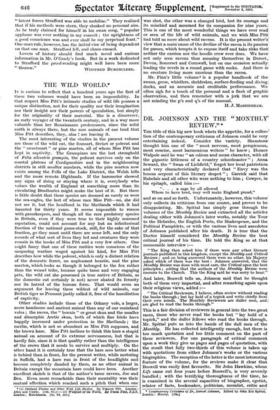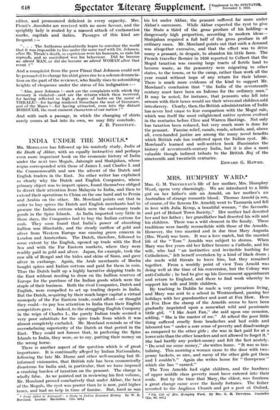DR. JOHNSON AND THE "MONTHLY/ REVIEW." *
THE title of this big new book whets the appetite, for a collec• 7 tion of the contemporary criticisms of Johnson could be very,
entertaining indeed. Consider the variety. Shenstonei thought him one of the "most nervous, most perspicuous, most concise, most harmonious writers " he knew ; Horace Walpole said he was "an odious and mean character, with all the gigantic littleness of a country schoolmaster " ; Anna Seward, the "Swan of Lichfield," forgot her local patriotism and very characteristically declared that "Envy was the bosom serpent of this literary despot " ; Garrick said that Rabelais and all other wits were nothing to him ; Cowper, in his epitaph, called him
• a sage by all allowed
Whom to have bred, may well make England proud,"
and so on and so forth. Unfortunately, however, this volume only collects its criticism from one source, and proves to be disappointing. Mr. Spittal has simply gone through the volumes of the Monthly Review and extracted all the articles dealing either with Johnson's later works, notably the Tour
to the Hebrides, the English Poets, the Shakespeare, and the Political Pamphlets, or with the various lives and anecdotes
of Johnson published after his death. It is true that the Doctor himself considered the Monthly. Review the best critical journal of his time. He told the King so at that memorable interview :— "The King then asked him if there were any other literary journals published in this kingdom, except the Monthly and Critical Reviews ; and on being answered there were no other, his Majesty asked which of them was the best : Johnson answered, that the Monthly Review was done with most care, the Critical upon the best principles ; adding that the authors of the Monthly Review were enemies to the Church. This the King said he was sorry to hear."'
And later, Boswell tells us, Johnson said that he thought both of them very impartial, and after remarking again upon their religious views, added ;-- " The Critical Reviewers, I believe, often review without reading- the books through ; but lay hold of a topick and write chiefly from their own minds. The Monthly Reviewers are duller men, and are glad to read the books through."
This is a fair division of reviewers in general into the two great races, those who never read the books but "lay hold of a
topick," and the duller fellows who read the books through. Mr. Spats' puts us into the hands of the dull men of the Monthly. He has collected intelligently enough, but there is too much quotation and too little comment on the part of these reviewers. For one paragraph of critical comment upon a work they give us pages and pages of quotation, with the result that fully two-thirds of this volume is taken up with quotations from either Johnson's works or the various biographies. The reception of the latter is the most interesting feature of the volume, for the reviews make it clear that Boswell was easily first favourite. Sir John Hawkins, whose Life came out four years before Boswell's, is very severely. handled ; with the terrifying thoroughness of the time, be
is examined in the several capacities of biographer, egotist, relator of facts, bookmaker, politician, moralist, critic and
• contemporary Criticisms of pr. Samuel Johnson, Edited by John Ser Spittal. London : Murray. 1108.]
editor, and pronounced deficient in every capacity. Mrs. Piozzi's Anecdotes are received with no more favour, and the sprightly lady is routed by a massed attack of exclamation marks, capitals and italics. Passages of this kind are frequent • • • The Authoress undoubtedly hopes to convince the world that it was impossible to live under the same roof with Dr. Johnson, after Mr. Thrale's death, so capricious were his humours, so rude his reproofs, and so uncivilized was his behaviour. Did he become an altered MAN, or did she become an altered WOMAN after that event 7"
And a complaint from the poor Piozzi that Johnson could not be persuaded to change his shirt gives rise to a solemn denuncia- tion on the part of the reviewer, who finally rises to astonishing heights of eloquence under the stress of his indignation :—
" Alas, poor Johnson !—such are the complaints with which thy memory is violated—,-such are the returns which thou receivest, for having reflected so high a degree of lustre on the name of THR,ALE!—for having rendered Streatham the seat of literature, and of the Muses !—for having attracted, even into the distant BOROUGH, the most eminent characters of our nation I"
And with such a passage, in which the changing of shirts surely comes at last into its own, we may fitly conclude. J. B. PRIESTLEY.



























































 Previous page
Previous page